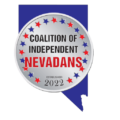
C.O.I.N.’s Public Policy Accountability Council (PPAC) focuses on providing information on critical issues facing Nevada during the state’s biannual legislative session.
Co-Chairs
Sondra Cosgrove College of Southern Nevada professor, the founder and executive director, Vote Nevada
Doug Goodman, the founder and executive director of Nevadans for Election Reform
PPAC will focus on legislation in the areas of:
- Education – Sondra Cosgrove and Bart Patterson
- Election Reforms – Doug Goodman
- Real Estate and Housing – Noah Herrera and Mike Chernine
- Small Business – Ash Mirchandani and Brian Almero
- Healthcare – Ritchie Duplichien
Facts on the Nevada legislature:
Nevada’s legislature meets every other year, in odd years, for 120 days, the first Monday in February through the first Friday in June.
When not in session, power rests with a 12 member legislative commission and various interim committees.
The legislature is not required to follow open meeting laws, making our voices more important.
How Does COIN Evaluate Proposed Legislation
1. Is the bill identifying a real issue or problem?
a. If yes, what is that issue or problem?
b. If no, do we need this bill?
2. Does the bill address the issue or problem identified in Question 1?
a. If no, you probably do not support the bill as written.
3. If a solution is proposed for the issue or problem:
a. What are the arguments for that solution?
b. What are the arguments against that solution?
4. Are alternative solutions proposed? If yes:
a. What are the arguments for those solutions?
b. What are the arguments against those solutions?
5. If you agree there is a problem, but you agree with an alternative solution:
a. Is the bill sponsor open to amending the bill?
b. If no, you probably do not support the bill as written.
6. Does the bill require funding?
a. Is the funding provided?
b. If no, does it require revenue to be raised? If revenue needs to be raised, the bill most likely will die.
7. Is the bill language specific with little room for interpretation?
a. If the bill language is vague, is the sponsor willing to clarify the language?
b. If not, you probably do not support this bill as written.
8. Does the bill include who or which organization is responsible for implementing the bill?
a. If no, is the sponsor willing to add implementation language?
b. If no and the sponsor is unwilling to add implementation language, you probably do not support the bill as written.
9. Does the bill include how the implementing person or organization will be held accountable?
a. If accountability measures are included, you should stay engaged to ensure those measures are enacted.
b. If there are no accountability measures, you probably do not support the bill as written.
10. Is the bill progressing through the legislative session under the Open Meeting Law rules?
a. Are all the hearings on the bill scheduled with sufficient time for the public to provide comments?
b. If the bill is heard in impromptu meetings with little public comments, be vigilant over any changes.
11. When doing research on the bill and any proposed solutions:
a. Are the arguments for and against based on facts, data, and verifiable evidence?
b. Are the arguments for and against presented respectfully without personal attacks?
c. Are arguments for and against free of misinformation?
d. If you answer NO to any of the above questions, proceed carefully
